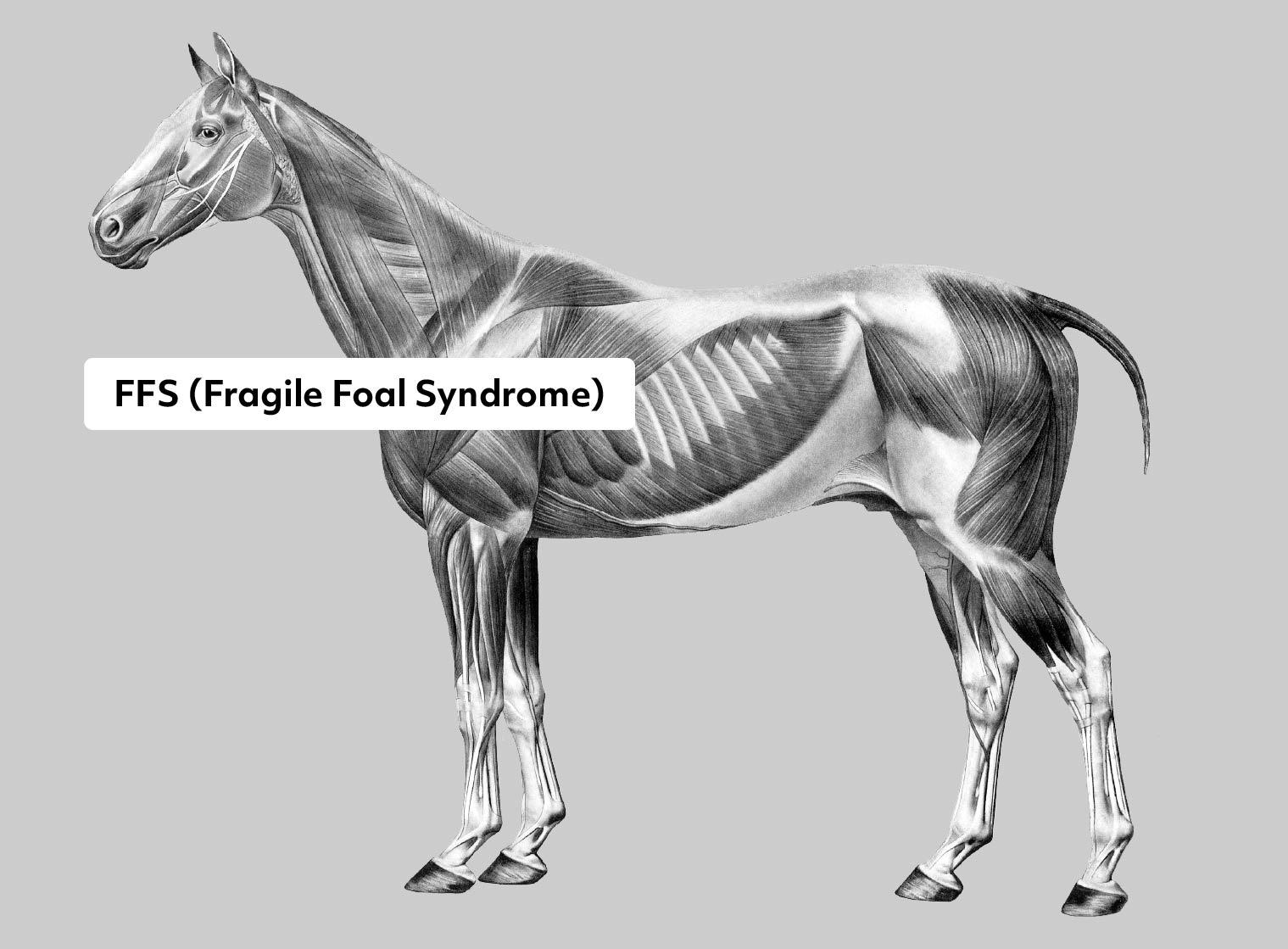"Warmblood" Fragile Foal Syndrome (ffs)
Gene or Region: PLOD1
Reference Variant: C
Mutant Variant: T
Affected Breeds: Warmblood and Other Breeds
Research Confidence: High - Findings reproduced multiple studies
Explanation of Results: ffs/ffs = homozygous for Fragile Foal Syndrome, trait expressed ffs/N = heterozygous for Fragile Foal Syndrome, carrier N/N = no variant detected
Warmblood Fragile Foal Syndrome: Genetic Testing and Health Insights for Horse Breeders
Fragile Foal Syndrome is a connective tissue disorder resulting in joint laxity and extremely thin skin that is only loosely connected to the body. The skin is easily torn, resulting in lacerations, hematomas, and seromas across the foal. Affected foals are euthanized shortly after birth. As Fragile Foal Syndrome is a recessive disorder, horses must inherit two copies (ffs/ffs) to show the disease. Horses with only one allele (ffs/N) are known as carriers due to their ability to produce affected offspring.
Learn more about Warmblood Fragile Foal Syndrome here.
Gene Information
PLOD1 is an enzyme involved in collagen synthesis. Mutations in mice and humans result in similar connective tissue disorders. The mutation observed in horses alters an amino acid, likely disrupting the function of the encoded protein.
References
Kehlbeck, A., Blanco, M., Venner, M., Freise, F., Gunreben, B., & Sieme, H. (2024). Warmblood fragile foal syndrome: Pregnancy loss in Warmblood mares. Equine veterinary journal.
Smythe, M., Dewberry, S., Staiger, E. A., Allen, K., & Brooks, S. (2023). 45 Quantifying gait quality changes in fragile foal syndrome carriers using artificial intelligence. Journal of Equine Veterinary Science, 124, 104347.
¹ Martin, K., Brooks, S., Vierra, M., Lafayette, W. T., McClure, S., Carpenter, M., & Lafayette, C. (2021). Fragile Foal Syndrome (PLOD1 c.2032G>A) occurs across diverse horse populations. Animal Genetics, 52(1), 137-138. https://www.researchgate.net/publication/345638537_Fragile_Foal_Syndrome_PLOD1_c2032GA_occurs_across_diverse_horse_populations
² Rahael, H., Smythe, M., Dewberry, S., Oberdorfer, A., Allen, K., & Brooks, S. (2023). 44 Detecting conformational differences in Fragile Foal Syndrome carriers utilizing artificial intelligence. Journal of Equine Veterinary Science, 124, 104346. https://doi.org/10.1016/j.jevs.2023.104346
³ Smythe, M., Dewberry, S., Staiger, E., Allen, K., & Brooks, S. (2023). 45 Quantifying gait quality changes in fragile foal syndrome carriers using artificial intelligence. Journal of Equine Veterinary Science, 124, 104347. https://doi.org/10.1016/j.jevs.2023.104347
⁴ Bellone, R. R., Ocampo, N. R., Hughes, S. S., Le, V., Arthur, R., Finno, C. J., & T. Penedo, M. C. (2020). Warmblood fragile foal syndrome type 1 mutation (PLOD1 c.2032G>A) is not associated with catastrophic breakdown and has a low allele frequency in the Thoroughbred breed. Equine Veterinary Journal, 52(3), 411-414. https://doi.org/10.1111/evj.13182
Monthoux C et al., “Skin malformations in a neonatal foal tested homozygous positive for Warmblood Fragile Foal Syndrome.” (2015) BMC Vet Res. 11: 12. PMID: 256373371.
More Horse Health
Equine Arteritis Virus Resistance
Equine Arteritis Virus Resistance (EAVR) is an infectious disease with a broad range of symptoms, though most horses will not display any overt signs. Infection can result in abortion in pregnant mares, and some stallions persistently shed the virus through their semen.
